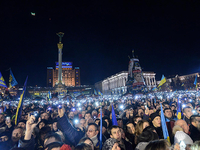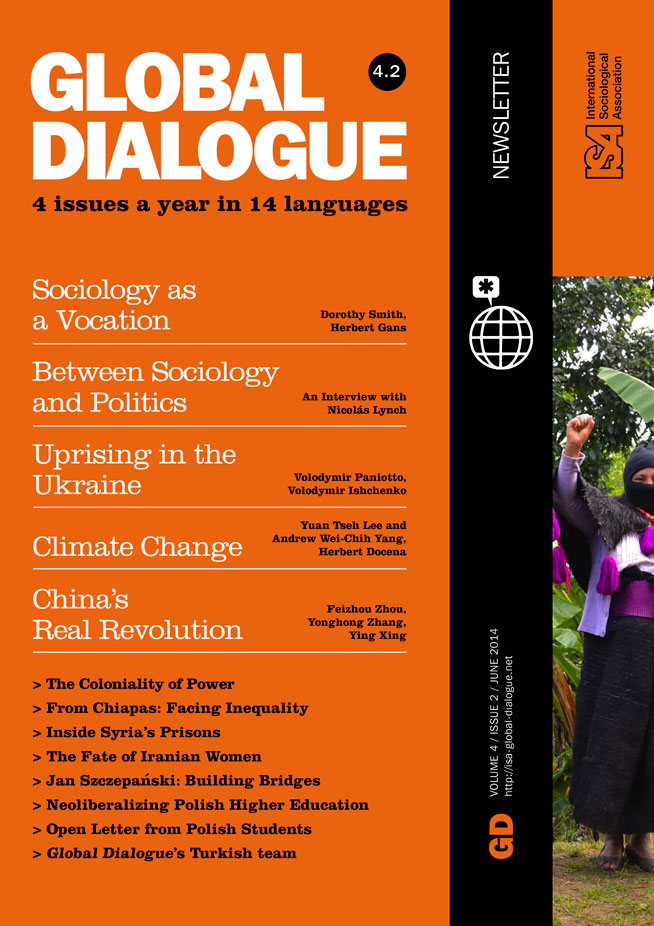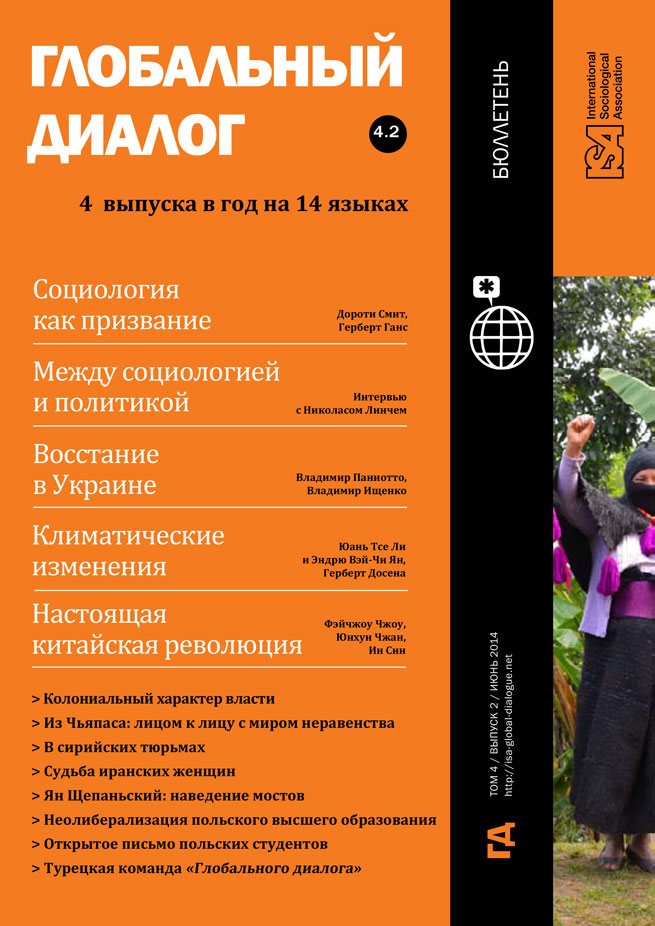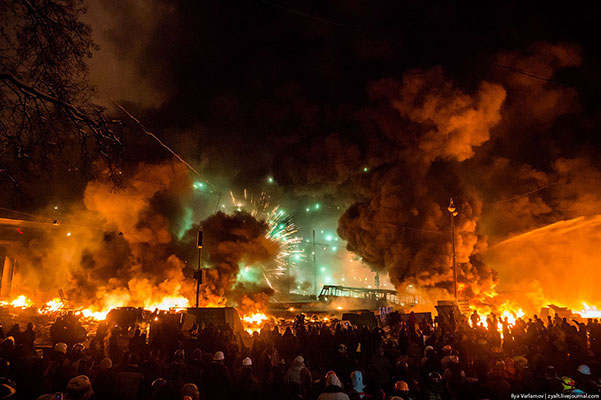Read more about Uprising in the Ukraine

Euromaidan: Profile of a Rebellion
by Volodymyr Paniotto
May 16, 2014
Given that the events in Ukraine are still rapidly developing, driven by “separatist” rallies in the Eastern and Southern regions and by Russian military intervention to Crimea, any attempts at theoretical generalization have to be tentative. Still, the rule of President Yanukovych has been toppled; the new government seems to be more or less efficiently taking control of almost the whole Ukrainian territory and has announced the first political and economic reforms.
Many analysts and activists have labeled the events as a “revolution” – “national,” “democratic,” “anti-colonial,” or “bourgeois.” What undeniably happened in Ukraine was a rebellion by part of the Ukrainian population (predominantly concentrated in the Western and Central regions with much less support in the Eastern and Southern regions) under the very weak direction and often contested leadership of the parliamentary parties, involving (in the final stages) violent confrontation between the police and armed paramilitary groups. The result was a change in the ruling elite. Although some political scientists[1] claim that this is enough to call it a “Tilly-type” revolution, the change of elites resulting from popular mobilization is not what arouses so much interest in revolutions. Instead, we are usually looking for and hoping for some potential for radical institutional, structural change.
Will the uprising bring forth change in the class or social-economic situation of Ukraine? The commanding heights of the economy are controlled by the same good old “oligarchs” – financial-industrial groups with close connections to the state. Moreover, they are now assuming even more overt control over both the central and local government. The Ukrainian “chocolate king” Petro Poroshenko (who worked in both Yushchenko and Yanukovych governments) has emerged as the most likely winner in the coming presidential elections. In an attempt to legitimize their rule in what are now oppositional regions and to strengthen national unity in the face of Russian intervention, the new government appointed some of the richest people in Ukraine (Ivan Kolomoiskyi, Serhiy Taruta) to be the regional governors in the Eastern parts of Ukraine.
The political conjuncture is becoming more pluralistic but this hardly means more democratic institutions. The attempt to monopolize power by the Yanukovych “family” has been effectively stopped in favor of a more collective oligarchic rule. Though the new constitution of 2004 gave more power to parliament, decreasing the power of the president, it can scarcely be called more democratic. Parliament’s elections will be organized exclusively on the basis of proportional representation by voting for party lists. The constitution does not propose any mechanism for people’s control over who will be the candidates on the party list (through primaries, for example). The party leadership has almost unlimited power over the composition of the party lists with the right to exclude dissenting MPs from parliamentary groups who in this case automatically lose their mandate. It is possible that the rules of parliamentary control could lead to a repetition of the disaster of January 16, 2014 when, rushing through the procedures and violating the constitution, parliament passed ten laws restricting freedom of speech and freedom of peaceful assembly.
One of the demands raised by the Maidan movement, one of the most important problems which brought people to the streets, and one of the issues at the center of the new government’s plan of action is transparency of political rule and fighting corruption. This issue cannot be ignored even if it is a buzzword for neoliberals. Establishing effective and transparent formal institutions in place of informal processes favoring those few close to the power elite would constitute an important modernizing breakthrough for Ukraine. However, it is highly doubtful that these issues can be tackled without also seriously challenging inequality and poverty in Ukrainian society. So far we have only seen the opposite – the government has declared its full readiness to accept every austerity measure demanded by the IMF as a condition for its badly needed loans, and thus only aggravating economic inequality. Moreover, any move toward greater transparency in the operation of the higher circles of government would not be supported by the oligarchs who depend on all sorts of informal state benefits that maintain their competitive advantage in the context of Ukraine’s peripheral capitalism. In an open competition with European corporations in the free-trade zone, selective protection and access to state resources will be even more important. International competition is the strongest factor limiting the expansion of Ukrainian national capital, hence the importance of state protection, itself facing competing pressures from the European Union and Russia. Paradoxically Ukraine’s “anti-colonial” revolution seems to be increasing the economic dependency of the country.
In the context of international support violence proved to be effective in confronting Yanukovych’s high-intensity but inconsistent coercion.[2] Nevertheless, it had also a number of detrimental consequences. Among them was the ascending career of the “Right Sector” coalition, including overt neo-Nazi groups, whose Maidan protests skyrocketed from the margins to the center and within three months became an influential factor in Ukrainian politics. However, these protests cannot be labelled a “fascist coup” – as depicted by the Russian media and some leftist analyses – since this would imply an armed, organized seizure of power from above, which does not capture the Ukrainian events. The Right Sector and the Maidan movement in general were hardly controlled by the political parties that came to power. The Right Sector has got arms (having seized guns from the police departments) and has gained some popular support as the heroes of a successful people’s rebellion.
As in the case of the great revolutions of the past, foreign intervention is a major factor in curtailing even such weak liberation potential as was found in Euromaidan where rising nationalist feelings pushed aside civic control over the government and other social agendas. Thus, should social-economic unrest arise once again – this time against the new government’s austerity measures and its overt oligarchic rule – it will be led most probably by the populist far right, and not by the incomparably weaker new left. As such it will leave little room for the development of a broader all-national movement so necessary in a culturally divided country, and, more than likely, it will fuel the dynamics of state disintegration without leading toward social transformation.
(Received March 9, 2014)
[1] http://www.psa.ac.uk/insight-plus/blog/ukraine%E2%80%99s-euromaidan-tillyanrevolution-can-lead-second-crimean-war
[2] http://www.washingtonpost.com/blogs/monkey-cage/wp/2014/02/26/whyukraines-yanukovych-fell-but-so-many-analysts-including-me-predicted-he-wouldsurvive/
Volodymyr Ishchenko, National University of Kyiv-Mohyla Academy, and Deputy Director of the Center for Society Research, Kyiv, Ukraine
This issue is not available yet in this language.
Request to be notified when the issue is available in your language.
If you prefer, you can access previous issues available in your language:













